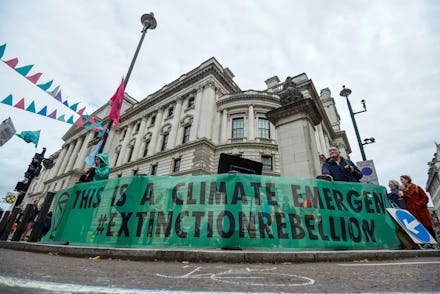This climate change activist group is using theatre as a form of protest

This week, climate change activist group Extinction Rebellion descended upon New York City with protests that combined vivid imagery with disruption to call for government action against climate change. On Monday, members of the group focused on landmarks in the financial district, splashing fake blood on the Charging Bull statue and lying 'dead' on the ground at the feet of the Fearless Girl. On Wednesday, activists made a Times Square intersection the docking site of a bright green boat that proclaimed "Act Now."
There was dancing, chanting, mourning, and traffic blocking. Around 90 activists were arrested Monday for civil disobedience. That protest caught the attention of tourists and workers alike. Most were supportive, reported The New York Times, though the journalist noted one or two pedestrians deriding them for the display.
"Get a job!" shouted one passer-by. "Human activity has nothing to do with the sun heating the Earth!" declared another.
Misinformed climate change deniers like them are exactly why Extinction Rebellion has brought their message to the U.S.
Extinction Rebellion was born in the U.K. in 2018, where the group gained momentum and notoriety by disrupting 'business as usual' in London. The protesters have successfully pushed the importance of climate change in the U.K. and prompted the country to become the first to declare an environmental emergency. The victory has spurred other supporters to follow the group and stage protests in cities across Europe. Not every country has responded as receptively — politicians in Australia have condemned the group and asked people to name protesters to publicly 'shame' them — but the agitation and results each peaceful protest brings have only fueled their efforts.
This week's protests in New York are part of the group's first major attempt at spreading to the States and a two-week "International Rebellion." They hope to bring attention to the climate change crisis in a country that is now internationally infamous for a federal government that openly denies the science behind global warming.
"The political situation is so different, with people not even agreeing that there's a climate crisis," said Jack Baldwin, news media liaison for Extinction Rebellion, to The New York Times.
But the changing attitude around climate change has given the group confidence to include the U.S. in its protests. The recent activity by youth activists like Greta Thunberg and others have drawn attention to the issue like never before. These young folks have put a spotlight on the U.N. and other political leaders by vocally denouncing their failure to act. Adult critics have felt threatened by the youth activists — which, Thunberg once noted, meant their message was being heard.
Extinction Rebellion protesters and organizers seem to understand and acknowledge the challenges that can make the U.S. different from the U.K. and Europe. As part of their efforts to spread awareness, they want to form coalitions with disadvantaged communities within the States to help the citizens who are the most impacted by environmental issues. Although they're still relatively unknown in the U.S., Extinction Rebellion believes they can work together with other activists to call for a change in the system. If it can work for climate change, hopes organizers, perhaps it can work for inequality, health care, and education issues as well.